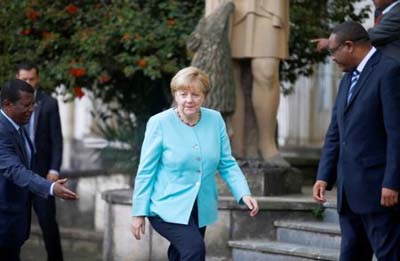
Reuters, Addis Ababa :
German Chancellor Angela Merkel told Ethiopia on Tuesday to open up its politics and ensure police do not use heavy-handed tactics against protesters, after more than a year of unrest that rights groups say has led to about 500 deaths.
Merkel, who spoke at a news conference with Prime Minister Hailemariam Desalegn, arrived in Ethiopia after a fresh flare up near the capital of the clashes that have cast a shadow over a nation with one of Africa’s fastest growing economies.
The violence prompted the government to declare a nationwide state of emergency on Sunday. Western states, which are among the biggest donors to what is still a poor nation, want their companies to win deals in Ethiopia but have become increasingly concerned by the government’s authoritarian approach to development.
“I made the case that you should have open talks with people who have problems,” Merkel told Hailemariam, adding that police should respond proportionately to protests.
Last week, protesters ransacked or torched about a dozen mostly foreign-owned factories, flower farms and other sites, accusing the government of building on seized land and stifling opposition. Opponents blamed police for provoking a stampede at a festival in Oromiya that killed at least 55 people on Oct. 2.
“In a democracy there always needs to be an opposition that has a voice – in the best case in parliament,” Merkel added. Opposition parties failed to win a single seat in parliament in the 2015 election, accusing the government of rigging the vote – charges which it denies. There was just one opposition lawmaker in the previous assembly. “The government is not using extreme violence. If it happened, we will investigate the units involved,” the prime minister responded.
Addressing parliament the day before Merkel arrived, Ethiopia’s president called for an amendment to the election law to allow “alternative voices” to be heard – an offer that a senior opposition figure dismissed as “too little, too late”.
In another show of German discontent, a diplomat said Addis Ababa had proposed that Merkel address parliament, but Berlin refused because it lacked any opposition members.
The diplomat, who asked not to be named, said the message being sent was that there was “no business as usual”.
The international community has praised Ethiopia for its economic achievements and development strategy. Under this, healthcare and other types of social support have spread across a country where most people rely on subsistence farming that has been hit by severe drought in the past two years or more.
A nation still renowned in the West for a devastating 1984 famine exacerbated by the policies of the then Marxist government, Ethiopia has been one of Africa’s fastest expanding economies for the past 15 years of so. In 2015, growth was 10 percent.
German Chancellor Angela Merkel told Ethiopia on Tuesday to open up its politics and ensure police do not use heavy-handed tactics against protesters, after more than a year of unrest that rights groups say has led to about 500 deaths.
Merkel, who spoke at a news conference with Prime Minister Hailemariam Desalegn, arrived in Ethiopia after a fresh flare up near the capital of the clashes that have cast a shadow over a nation with one of Africa’s fastest growing economies.
The violence prompted the government to declare a nationwide state of emergency on Sunday. Western states, which are among the biggest donors to what is still a poor nation, want their companies to win deals in Ethiopia but have become increasingly concerned by the government’s authoritarian approach to development.
“I made the case that you should have open talks with people who have problems,” Merkel told Hailemariam, adding that police should respond proportionately to protests.
Last week, protesters ransacked or torched about a dozen mostly foreign-owned factories, flower farms and other sites, accusing the government of building on seized land and stifling opposition. Opponents blamed police for provoking a stampede at a festival in Oromiya that killed at least 55 people on Oct. 2.
“In a democracy there always needs to be an opposition that has a voice – in the best case in parliament,” Merkel added. Opposition parties failed to win a single seat in parliament in the 2015 election, accusing the government of rigging the vote – charges which it denies. There was just one opposition lawmaker in the previous assembly. “The government is not using extreme violence. If it happened, we will investigate the units involved,” the prime minister responded.
Addressing parliament the day before Merkel arrived, Ethiopia’s president called for an amendment to the election law to allow “alternative voices” to be heard – an offer that a senior opposition figure dismissed as “too little, too late”.
In another show of German discontent, a diplomat said Addis Ababa had proposed that Merkel address parliament, but Berlin refused because it lacked any opposition members.
The diplomat, who asked not to be named, said the message being sent was that there was “no business as usual”.
The international community has praised Ethiopia for its economic achievements and development strategy. Under this, healthcare and other types of social support have spread across a country where most people rely on subsistence farming that has been hit by severe drought in the past two years or more.
A nation still renowned in the West for a devastating 1984 famine exacerbated by the policies of the then Marxist government, Ethiopia has been one of Africa’s fastest expanding economies for the past 15 years of so. In 2015, growth was 10 percent.

